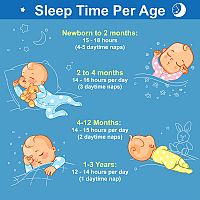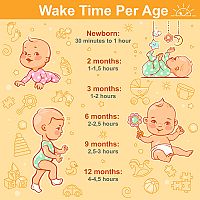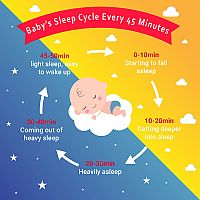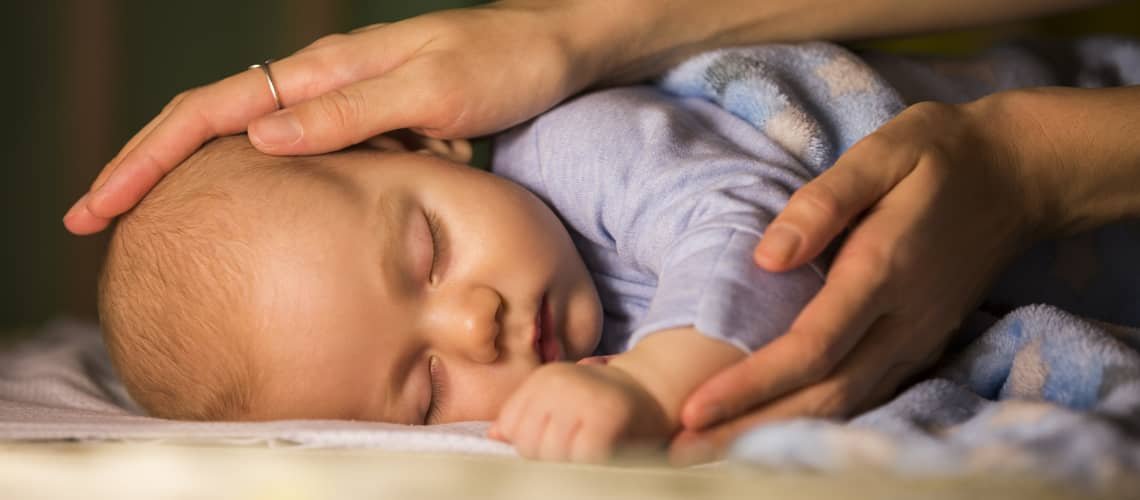
Children's sleep by age - table. How much sleep do babies need?
You can read about the importance of sleep for the growth and development of children in every book or internet article. And so it is right. However, what should not be forgotten is that the need for sleep in a newborn, infant, toddler - child changes with age. Across the spectrum of adults, a very wide diversity is found. While one person says that after 5 hours they are fresh, for another, even a hearty 9 hours of sleep is not enough. Insufficient sleep in adults is a risk in the long term, and this applies a hundredfold in children. Sufficiently long and high-quality sleep in optimal conditions affects the child's development, behavior, ability to perceive and learn. Every mother hopes that there will be no problem with her baby's sleep. Man thinks, life changes. If you are interested in how much a newborn sleeps, how long children should sleep and why the length of sleep according to age is important, read our article.
There is no substitute for sleep in children. The same applies to adults, coffee, tea, energy drinks or other stimulants, none of these can deceive the body enough to replace sleep. The "smaller person", the more sleep you should get. Therefore, children logically need more sleep. The National Sleep Foundation (The National Sleep Foundation) prepared a study a few years ago, in which it indicates how much, depending on age, a person should optimally spend sleeping during the night/day. A newborn requires more hours of sleep than a 3-year-old child, and children's sleep needs are constantly changing from birth. We should not forget the fact that the length of sleep for babies is individual. However, there are certain barriers that already set a limit on how much sleep, considering the child's age, is already disproportionately little. Do not forget, sleep is the basic biological need of every person. How long should children sleep?
Children's sleep by age and its quality
Each person has their own stable biological needs, which are necessary for the proper functioning of the organism. Sleep is one of these needs, similar to thirst and the need to drink liquids or hunger, which we satisfy with quality food. In order for the child to be satisfied, healthy and able to function in an optimal mode during the day, quality sleep is the alpha and omega of the fact that the child will be sufficiently active when awake and sleepiness will occur at the right time. Sleep itself is a source of energy.
Sleeping habits are closely related to the circadian rhythm, and without quality sleep, a child of any age cannot create his biological rhythm. As we have already mentioned, with the increasing months and years, the requirements for the length of sleep in children change, but the quality of sleep is also related to this. It is based on a continuous and undisturbed sleep cycle. Of course, you can't expect a 2-month-old baby to sleep undisturbed all night. Waking up to feed, to feel wet, or to change position is completely normal for children. After all, sleep regression or a growth spurt can also cause children to wake up at night and have interrupted sleep. These are phenomena that are related to changes in development and can result in a natural deterioration of sleep. These are temporary conditions that should not be responsible for chronic sleep impairment.
However, consistency in creating sleep habits should never be lacking, because the child does not create them by himself. Try to observe a certain ritual before each sleep, which will help the child to form a bond over time with the fact that if bathing now follows, then feeding and sleeping will follow. The sleep pattern must be followed in order to avoid the formation of inappropriate habits. Of course, parents must also expect periods when there will be less sleep, the child will be nervous, irritable, rejecting, which will cause problems with sleep and will subsequently disturb his waking time - activity, concentration, composure, ability to learn, etc. An optimal sleep regime ensures an ideal state of alertness for the child.
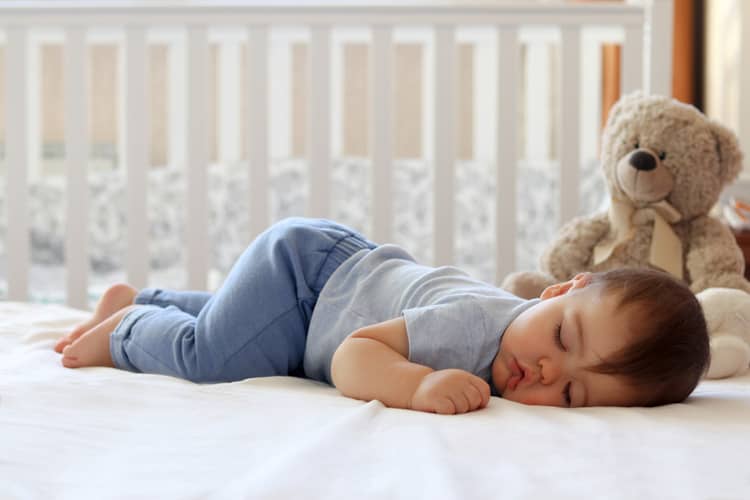
Consequences of poor quality sleep in children
An adult can feel and observe a lack of quality sleep in his body and mind. While an adult can endure a few days without an ideal sleep regime, children perceive the lack of quality sleep much more sensitively. At the same time, the practice that if the child did not sleep well at night, he will mature during the day and so on, is often not true. In this way, you disturb the child's daytime sleep (if he still practices it), his circadian rhythm is out of tune, and the accumulation of incorrect sleeping habits leads to negative consequences. What negative effects can lack of sleep have on children?
- Fatigue and exhaustion,
- nervousness, irritation, aggressiveness
- tearfulness and moodiness - inability to control your emotions,
- negative impact on cognitive development – inability to concentrate, learn, impaired memory,
- impaired coordination of movements and visual perception - inattention, more frequent falls and impaired perception even in familiar surroundings,
- negative impact on immunity and health (chronic sleep problems).
Sleep in children greatly contributes to the proper development and functioning of the brain. In the early stages of babies' development, sleep is all the more important. It affects the mental and physical health of the child, and thanks to sufficient quality and long sleep, it is alert, active, perceptive, balanced and concentrated. The brain is constantly active even during sleep. However, the "sleep activity" of the brain during proper sleep has a primarily regenerative character for the brain - thoughts are sorted, the level of cortisol (stress) is reduced, brain capacity is increased and the senses are much more sensitive as a result.
Children's sleep - table
The indicated optimal sleep intervals in this table are based on a study by The National Sleep Foundation. Of course, the table is primarily indicative, but it is based on practical experience. It is not possible for every child to meet the table values. Sleep cycles may differ for individual children, but this may not mean a problem if the child is thriving and the parents do not have a problem with his sleeping habits. In the case of babies, toddlers or small children, it is also important to perceive that the total amount of sleep consists of day and night sleep, while the optimal interval for sleep at a given age should be fulfilled in the sum of 24 hours. Many parents often worry about whether their child is getting enough sleep.
The ideal length of sleep for the given age of the child can be found in the table above. Again, it is important to emphasize that the time data itself has an advisory nature. The need for sleep from a newborn to the age of 6 changes significantly. Daily sleep indicates the average value of how much a child should sleep during the day. Also in the table you will find information about how many daily sleeps should fulfill this recommended norm. In the case of nighttime sleep, this is the average value of how much a child should sleep during the night. The total value (total sleep) indicates the average sleep time in the sum of day and night sleep. That is, the total amount of time a child should sleep in 24 hours.
How much sleep do babies need?
You can find the answer in the table above. However, parents have to take into account the fact that there are only a few children with a chart. It concerns not only sleep, but also overall psychomotor development. The length of sleep is also influenced by the baby's sleep rhythm, conditions, environment and the like. Some parents struggle with the fact that their child does not want to sleep, others do not have a problem with their children's sleep. In any case, it is important to know, at least roughly, how long children should sleep, because lack of sleep leads to negative phenomena in the child's behavior and development.
Newborns are a typical example of how important sleep is for a child. Their need for sleep is very high, because the newborn's body is getting used to a completely new world and regime. Even in the womb, the baby had phases of wakefulness and phases of sleep, which clearly prevailed. The month-old baby is getting to know the environment and is still getting used to the sleep rituals associated with day and night.
Roughly around the 3rd-4th month, we can talk about the infant's daytime and nighttime sleep. Ideally, there are changes in daytime and nighttime sleep, while the amount of sleep in such a small baby remains plentiful. During this period, sleep regression can appear, which can disrupt the child's nighttime sleep, causing the baby to wake up frequently at night.
At 6 months, the time of night sleep increases and the need for daytime sleep decreases. The time of wakefulness increases when the child is active. Around 1 year, the frequency of daily naps decreases to 1 to 2, while they make up a significantly smaller part of the total sleep time. The child socializes more, but is most fixated on the mother. At this age, sleep can be affected by separation anxiety, which is the fear of separation. The child wakes up so often, the reason being only the need for physical contact. Waking up the baby at night can also be caused by growing teeth, painful gums, but also diseases, for example.
From the 13th to the 18th month, the duration of daily sleep is already shortened and for many children even 1 sleep lasting 1 to 2 hours is enough. By the age of 2, the child already has a sleep routine, a routine that is tied to associations related to sleep time. Evening rituals before bedtime are very important, because it is at this age that it often happens that children do not want to go to sleep. They are very active and energetic, they want to explore everything, discover and be omnipresent. Furthermore, the need for nighttime sleep begins to shorten. At the age of 3 to 5, one nap in the afternoon is enough, and at night the child sleeps an average of 8 to 12 hours. Sleep can be disturbed by children's fantasies, fear of the dark or ghosts. Don't forget to read a fairy tale before going to bed and chase the monsters out of the window from under the bed.

Afternoon sleep in children
Afternoon sleep is typical for small children. This sleep ritual usually persists in children until the time they attend kindergarten. However, many children start to skip their afternoon nap between the ages of 3 and 5. Everything is primarily related to how much sleep the child needs and what his sleep rhythm is. During this period, it is standard for children to sleep in kindergarten. It is similar to an afternoon nap, the duration and need of which changes significantly in the development of the child. During the period of attending preschool (kindergarten), i.e. between the ages of 3 and 5, the afternoon nap lasts 1 to 2 hours. Sleep at night can last from 9 to 12 hours. Afternoon sleep is important from the point of view of the child's needs. If the child shows tiredness in the afternoon - rubs his eyes, yawns, is irritable or moody - he needs an afternoon nap.
Sometimes, if a child struggles with an afternoon nap at this age, it is better to choose a relaxation activity for the child. Listening to a fairy tale, reading from a book, etc. In a way, such an activity can function as a lullaby. If the child misses his afternoon nap, try to put him to bed a little earlier. Especially if you notice that he is showing signs of fatigue.
Children's sleep - experiences
In discussions, mothers often solve situations regarding the child's sufficient sleep, bedtime, or they are troubled by the children's frequent awakenings at night, or the baby's restless sleep. Some mothers strictly advise that a one-year-old child no longer sleeps twice a day. Women also emphasize that every child is different. One of the discussants states that her one-year-old child sleeps until 7:00 a.m., but does not fall asleep before 9:00 p.m. Other mothers, on the other hand, try to observe the " evening " and put the child to bed at 7:00 p.m. after feeding. According to the discussants, sleeping conditions are also important, and the infant should have complete darkness and not too high temperature in the room to fall asleep.
For a change, some mothers are too busy with charts. Although in the case of a six-month-old child, the standard is 2 to 3 daily naps, which can last an hour, they can also last 30 minutes and it does not have to be a problem. In some cases, the interval of daily naps is extended over time. Female contributors to the forum also deal with the length of night sleep and more frequent awakenings. Women advise that arousal can be influenced by several factors - teeth growth, sleep regression, separation anxiety or hunger. It is normal for a child to have short-term sleep problems at certain times. For chronic sleep problems, see a pediatrician.
The most frequent questions - FAQ
Are you worried that your child is sleeping too little? Do you feel that your child has restless sleep or do you want to increase the quality of your child's sleep? The need for sleep in children gradually changes and with increasing age, this need becomes shorter. Sleep requirements are often very individual and are influenced by several factors. In the case of babies, the recommended sleeping time is very important. After all, healthy sleep is essential for the proper development of children. Do you have a problem with your child sleeping too little? What are your experiences with your children's sleep? Your practical knowledge can be very beneficial for other mothers. Join the discussion and share your experiences with other moms who are looking for valuable advice and information.
How much should a one-year-old baby sleep?
Is it appropriate for children to sleep with their parents?
When should the children go to bed?
How do I know if the baby is sleeping enough?
Gallery
Pridať komentár

